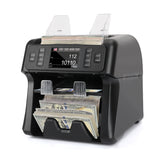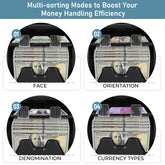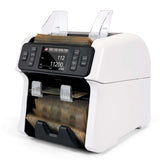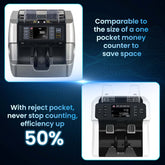What happens when depositing large cash into the bank (over $10,000)?
You've just closed a big deal, and now you've hit the jackpot! But what comes next?
When you head to the bank to deposit this large amount of cash, things might not be as straightforward as expected. There could be some bumps along the way.
Let's discuss the procedure when depositing a considerable amount of cash in a bank and how to prevent a hectic $250,000 penalty.
How Banks Handle Large Sums of Money

As soon as you walk into the bank with a large amount of cash, heading to the branch, the bank teller will immediately give you attention. Not because you're handsome. But, because large cash deposits are subject to strict regulations.
Banks must report any cash deposits over $10,000 to the Financial Crimes Enforcement Network (FinCEN) as part of the Bank Secrecy Act. The BSA exists to prevent money laundering and other financial crimes.
Besides the FinCEN report, you should fill out a Currency Transaction Report (CTR). This form requires detailed information about you and the transaction, including your Social Security number and a government-issued ID.
The bank will also ask questions about the source of the funds to ensure everything is legitimate. It might feel intrusive, but it's a standard procedure made to protect you and the financial system.
If you avoid CTR, you find SAR.

For example, you sold your car for $14000, then you deposited the first $7000 in the morning and the remaining $7000 later that day.
However, never try to dodge the system.
This practice is known as structuring and is illegal. If the bank suspects structuring, they will file a Suspicious Activity Report (SAR), which can lead to severe penalties, including:
- Fines up to $250,000for individuals ($500,000 for organizations)
- Imprisonment for up to 5 years.
- Or both
Check out this FinCEN CTR Guide to see different structuring examples.
When structuring involves more than $100,000 over twelve months or occurs while violating another Uncle Sam law, then the penalty doubles.
How do you keep yourself safe from structuring?
Instead of dodging CTR and landing in trouble, provide all necessary info and keep track of where the money comes from to avoid anything shady/illegal.
What tools do banks use for large amounts of cash?

Banks use sophisticated money counter machines to handle large cash deposits efficiently, which also sort the banknotes by denominations—as required by the central bank.
Speaking of money counters, if you deal with large amounts of cash regularly, it is worth investing in a high-quality money counter machine similar to those used by banks.
Introducing: NuCoun VS-75 money counter machine. It counts up to 1200 banknotes per minute under mixed denomination mode while spotting fake bills, including the superdollar.
Plus, it can sort your cash by denomination, face, orientation, or version. I am sure you will make every bank teller day.
Be aware of fees
Depositing large amounts of cash can also come with fees.
- Percentage-Based Fees: Some banks charge a percentage of the deposit amount, ranging from 1%to 0.3% of the total deposit.
- Flat Fees: Other banks might charge a flat fee for large deposits, ranging from $10to $30 per deposit.
- Account Type: Premiumor business accounts might have different fee structures or even not charge any fees for large cash deposits.
Check with your bank about their specific fees, which helps prevent surprises.
Coin deposit
Deposits with a large amount of coins may be more cumbersome.
Many banks require coins to be rolled and sorted by denomination before they are accepted. Some banks have coin-counting machines, but these are becoming less common.
Thus, deposits mainly go through cash, so count yours with VS-75.









